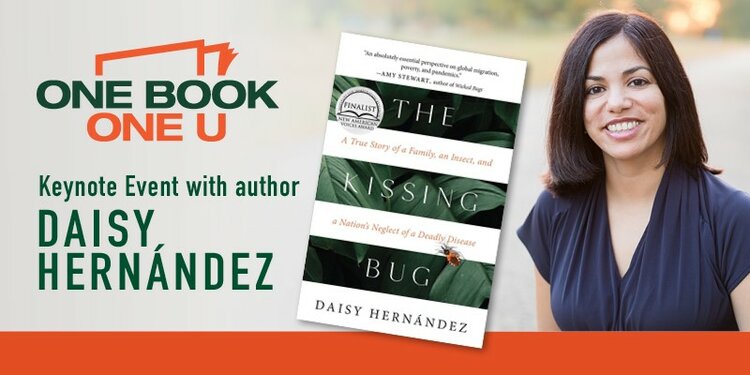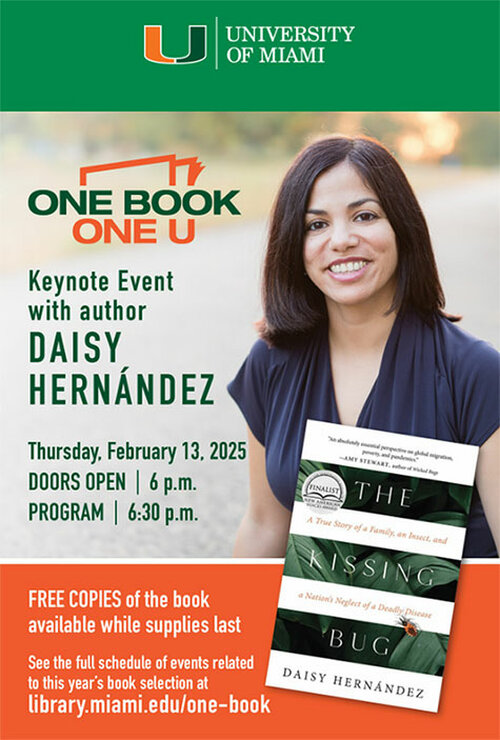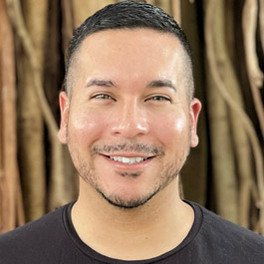Accessibility Options:
Selection for 2024-2025
The Kissing Bug: A True Story of a Family, an Insect, and a Nation’s Neglect of a Deadly Disease
by Daisy Hernández

Our selection for 2024-25 is Daisy Hernández’s The Kissing Bug, a top 10 best nonfiction book of 2021 – Time Magazine and selected for the National Book Foundation’s Science & Literature. Hernández’s own family story inspired the book. After watching her aunt endure a painful yet unnamed disease for decades, Daisy spent seven years researching and uncovering the facts of the invisible Chagas disease.
One Book, One U Common Reading Program
The One Book, One U program selects a book for each Spring semester to provide a shared educational experience in our university community. Find information on upcoming events as well as research resources, dicussion guides, and more!
Pick up a copy of the book!
Visit Richter Library's Access Services desk to receive a free print copy of the One Book, One U selection, while supplies last!
Contact Information
Find a copy of the book in a library!
If you are a member of the UM community, use the links below to get access to the eBook:
If you are a member of the South Florida community, check your local library to find a copy of the ebook available for check out.
Events
Presentation & Panel Discussion:
A Voice for Chagas: Bringing Awareness to a Neglected Tropical Disease
Wednesday, February 12, 2025
Doors open 9:30 a.m.
Program 10 a.m.
Louis Calder Memorial Library
First Floor Collaboration Space
1601 NW 10th Avenue
Miami, Florida 33136
Registration Information
Save the Date: Keynote Event with author Daisy Hernandez
February 13, 2025
Doors Open: 6 p.m. Program: 6:30 p.m.
Registration Information
Search our databases for research based on themes in The Kissing Bug.
Readings
- Research priorities for Chagas disease, human African trypanosomiasis and leishmaniasis : technical report of the TDR Disease Reference Group on Chagas Disease, Human African Trypanosomiasis and Leishmaniasis.
- Chagas disease : basic investigations and challenges
- Control of Chagas disease : Second Report of a WHO Expert Committee.
- Chagas Disease
Publications- Peer-review Research from UM Faculty
- Screening and Treatment of Chagas Disease in Organ Transplant Recipients in the United States: Recommendations from the Chagas in Transplant Working Group
- A Random Sequencing Approach for the Analysis of the Trypanosoma cruzi Genome: General Structure, Large Gene and Repetitive DNA Families, and Gene Discovery
Save the Date: February 13, 2025

UM Instructional Designers
Other Resources
Ask A Librarian!
Discussion Questions
Using the Chapter Summaries document, select a chapter that relates to your class or group and host a discussion session. As a starting point, you can use the questions below, adapted from the American Library Association Book Discussion Group online guide.
Questions to Discuss For Non-Fiction
- If your book is a cultural portrait --of life in another country, or different region of your own country--start with these questions first:
- What does the author celebrate or criticize in the culture? Consider family traditions, economic and political structures, the arts, language, food, religious beliefs.
- Does the author wish to preserve or reform the culture? If reform, what and how? Either way—by instigating change or by maintaining the status quo—what would be gained or what would be at risk?
- How does the culture differ from yours? What was most surprising, intriguing, difficult to understand? After reading the book, have you gained a new perspective—or did the book affirm your prior views?
- Does the book offer a central idea or premise? What are the problems or issues raised? Are they personal, spiritual, societal, global, political, economic, medical, scentific?
- Do the issues affect your life? How so—directly, on a daily basis, or more generally? Now or sometime in the future?
- What evidence does the author give to support the book's ideas? Does he/she use personal observations and assessments? Facts? Statistics? Opinions? Historical documents? Scientific research? Quotations from authorities?
- Is the evidence convincing? Is it relevant or logical? Does it come from authoritative sources? (Is the author an authority?) Is the evidence speculative...how speculative?
- Some authors make assertions, only to walk away from them—without offering explanations. It's maddening. Does the author use such unsupported claims?
- What kind of language does the author use? Is it objective and dispassionate? Or passionate and earnest? Is it polemical, inflammatory, sarcastic? Does the language help or undercut the author's premise?
- Does the author—or can you—draw implications for the future? Are there long- or short-term consequences to the problems or issues raised in the book? If so, are they positive or negative? Affirming or frightening?
- Does the author—or can you—offer solutions to the problems or issues raised in the book? Who would implement those solutions? How probable is success?
- Does the author make a call to action to readers—individually or collectively? Is that call realistic? Idealistic?Achievable? Would readers be able to affect the desired outcome?
- Are the book's issues controversial? How so? And who is aligned on which sides of the issues? Where do you fall in that line-up?
- Can you point to specific passages that struck you personally—as interesting, profound, silly or shallow, incomprehensible, illuminating?
- Did you learn something new reading this book? Did it broaden your perspective about a difficult personal issue? Or a societal issue? About another culture in another country... or about an ethnic / regional culture in your own country?
